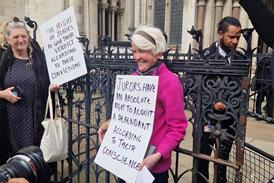Most rights referred to as ‘squatters’ rights’ are rights available to everyone, but only those without some other legal protection (such as the Protection From Eviction Act 1977) need to rely on them alone, writes Myk Zeitlin.
It is important to distinguish a squatter from a tenant holding over, or someone who previously had some right of occupation.
The media regularly fails in this respect.
There is no formal definition of a squatter, but legislation and court rules effectively distinguish someone who occupies as a trespasser, having originally entered as such.
Occupation of land amounts to a title to it, albeit the weakest form of title. In general, a squatter may rely on that title until and unless someone is able to establish a superior title through the courts, or by one of the rarely applicable other means discussed below.
If that has not been done within the statutory limitation period, the squatter is entitled to register a possessory title, and any claim for possession by the ‘paper’ owner would be barred.
However, this is now only rarely applicable to registered land, due to the operation of the Land Registration Act 2002, but is regularly relied on where land is not registered. Most such cases concern garden extension and so on, rather than adverse occupation of buildings.
The main protection on which squatters rely to prevent arbitrary or violent eviction is the right not to have the occupied premises forcibly entered by others without lawful authority.
This is covered by part II of the Criminal Law Act 1977 (as amended by the Criminal Justice & Public Order Act 1994), particularly section 6 (1), which states that:
‘Subject to the following provisions of this section, any person who, without lawful authority, uses or threatens violence for the purpose of securing entry into any premises for himself or for any other person is guilty of an offence, provided that:(a) there is someone present on those premises at the time who is opposed to the entry which the violence is intended to secure; and(b) the person using or threatening the violence knows that that is the case.’
Section 6(4) clarifies this:‘It is immaterial for the purposes of this section:(a) whether the violence in question is directed against the person or against property; and
(b) whether the entry which the violence is intended to secure is for the purpose of acquiring possession of the premises in question or for any other purpose.’
The relationship between the occupiers and any claimants to possession is a civil relationship, which does not affect other areas of law. Squatters have a right to a hearing in court to determine whether the claimant does have a right to the property.
This means not only the opportunity to argue that they are not squatters, and have some form of legal security, but also that the claimant must show an immediate right to possession, which is required.
It is surprising how many claimants go to court exhibiting documents showing that somebody else has a right to possession, or has a better claim.
The position of human rights defences to possession claims against squatters is in a state of flux.
The current position, as shown in the recent decision of the Supreme Court in Pinnock v Manchester City Corporation [2010] UKSC 45, is that a court should be able to balance the rights of occupiers with those of public property owners, applying proportionality and outside the traditional scope of judicial review.
For example, a local authority should have to show that it will be making good use of a property before evicting long-standing occupiers.
Serving notice
Those taken to court have a right to be served all the documents with a certain amount of notice, which varies depending on whether the property is residential or not, and on whether there is also an application for an interim possession order.
They have the right to be named and served individually, if their name is known to the claimant.
If a possession order is made by a court, the squatters still have the same protection under section 6 of the Criminal Law Act 1977, and the claimant is not authorised to effect an eviction.
Lawful authority to force entry and evict is confined to court bailiffs (enforcement officers) acting on a warrant or writ. If an interim possession order is made and properly served, it becomes a criminal offence to remain in occupation after 24 hours.
The only alternatives to proceedings in the County Court apply in cases where there is a strictly defined ‘protected intending occupier’ or the mythical ‘displaced residential occupier’.
Only the former needs to be considered. The definitions of this term (varying according to circumstances) and the requirements for the certificate such a person needs to produce are set out in section 12 of the Criminal Law Act 1977 (as amended).
Myk Zeitlin is a volunteer at the Advisory Service for Squatters, which provides legal and practical advice to squatters and other homeless people
Squatters’ rights are a claim to legal or better actual title by possession of the land for at least 12 years, and without the owner’s consent, writes Gavin Patience.
It is sometimes thought that those who make such claims are always strangers, who, unbeknown to an absentee landlord, take advantage of that absence to stake a claim in his property.
However, much of the recent case law has involved a landowner who had agreed that someone else could use his property (for example, as a licensee) but then left the lawful occupier undisturbed for long enough that they were able to assert claims to legal ownership.
Landlords and their advisers need to keep abreast of such developments to make sure they don’t fall foul of such claims.
The most important recent case is J A Pye Oxford Limited v Graham [2002] UKHL 30.
The defendants, the original graziers, occupied land under an annual agreement, while the property development company owners applied for planning permission to build on it.
The arrangement suited everyone: the land was cared for, the cattle were fed, and the landowners received a modest rental income while they battled with the planning authority.
However, at some point, someone at Pye forgot to renew the annual licence, and after a period of 12 years, the Grahams registered an application for possessory title at Land Registry.
Pye objected, and in due course, the case went to the House of Lords, which confirmed that ownership, both at common law and under the Limitation Acts, had passed to the defendants, because they had been in actual possession of the land throughout the statutory period, and had shown every intention of asserting custody and control against the ‘paper’ owner.
Even the Law Lords said the decision was harsh, but Pye lost.
The case eventually ended up in the European Court of Human Rights, where, by a majority of 10 judges to seven, the House of Lords’ decision was upheld as not being in breach of article 1 of the European Convention on Human Rights.
In J Alston & Sons Limited v BOCM Pauls Limited [2008] EWHC 3310 (Ch), the claimant, who had been allowed to farm agricultural land, rent free, and on the understanding that BOCM could take back possession at any time without compensation, brought a claim for ownership 12 years after BOCM had allowed the permission to expire.
BOCM took the matter to court and lost. The High Court was satisfied that the claimant’s farming company had spent time and effort ploughing and irrigating the land, to the exclusion of all others.
In giving his judgment, Mr Justice Marshall said: ‘It is not a major or difficult thing to ensure that one reviews and protects one’s property interests, and the policy of law is that if that is not done, the person making actual use of the property gains the right to keep it.’
The same principle – actual occupation and intention to possess – may even apply to land occupied by a tenant if special circumstances apply – see the excellent judgment of Lord Justice Neuberger in London Borough of Tower Hamlets v Barrett [2005] EWCA Civ 23.
This case related to a derelict parcel of land measuring 27x6m, next to the Palm Tree Public House in Bow, London.
When the former tenant bought from the brewery ‘subject to all existing tenancies’, they also acquired title to that parcel of land occupied by them as tenants from 1977 to 1993.
In another recent case, Port of London Authority v Rupert Ashmore [2010] EWCA Civ 30, which related to a sailing barge that had been moored in the same place for 25 years, Sir John Chadwick found that: ‘In appropriate circumstances, it is possible to acquire title to unregistered sea or riverbed for the footprint of the vessel … which rests on the bed … at low tide.’
Avoiding claims
So what is the practical response for a landowner wanting to resist claims of this nature?
First, inspect. Advise clients to make frequent visits to their site or property, either personally or by agents, and to address any issues arising.
‘No trespassers’ signs can be ignored or removed, and may not prevent the 12-year period of adverse possession running.
Even serving a ‘notice to quit’ does not stop the statutory period running (see Mount Carmel Investments Limited v Peter Thurlow Limited [1988] 3 All ER 129).
Second, instruct. Clients should instruct their agents or solicitors to prepare, revise and renew grazing, rental or lease agreements.
A ‘gentleman’s agreement’ to occupy land may be cheap, but it is a false economy: a tenancy-at-will could turn into a full-blown tenancy.
A properly drawn lease agreement is money well spent, and if critical dates (such as renewals) are missed, then the client has the added bonus of falling back on professional indemnity insurance.
Third, insure. Clients may already have legal expenses insurance as an endorsement to a buildings or block policy, but underwriters may seek to avoid a claim if an inspection programme is not in place, or if undue latitude has been given to any occupiers.
Consider instead specialist commercial legal protection policies which are designed to fund costs of offensive as well as defensive action.
The appropriate policy will also fund expert witnesses and the costs of appealing or defending an appeal.
Gavin Patience is a consultant in the real estate department of Knights Solicitors, Newcastle-under-Lyme, Cheltenham and Alderley Edge, Cheshire
Property in practice
This article was first published in the March issue of Property in Practice, the magazine of the Law Society’s Property Section. A representative membership association of the Law Society, the Property Section provides best practice information and support to solicitors on areas including e-conveyancing, housing, land registration, money laundering, planning and environment, tax and revenue. Benefits include a quarterly magazine; regular electronic newsletter with case law updates; interactive website; CPD-accredited events; and discounts on related products and services. For more details about the section, call 020 7320 5873 or email propertysection@lawsociety.org.uk.


















![David Lester (senior partner at Blythe Liggins), Darryl Barnes, Jagdeep Sandher (head of dispute resolution at Blythe Liggins)[4]](https://d1d8vslyhr7rdg.cloudfront.net/Pictures/274x183/4/2/8/116428_davidlesterseniorpartneratblytheligginsdarrylbarnesjagdeepsandherheadofdisputeresolutionatblytheliggins4_981603_crop.jpg)





No comments yet